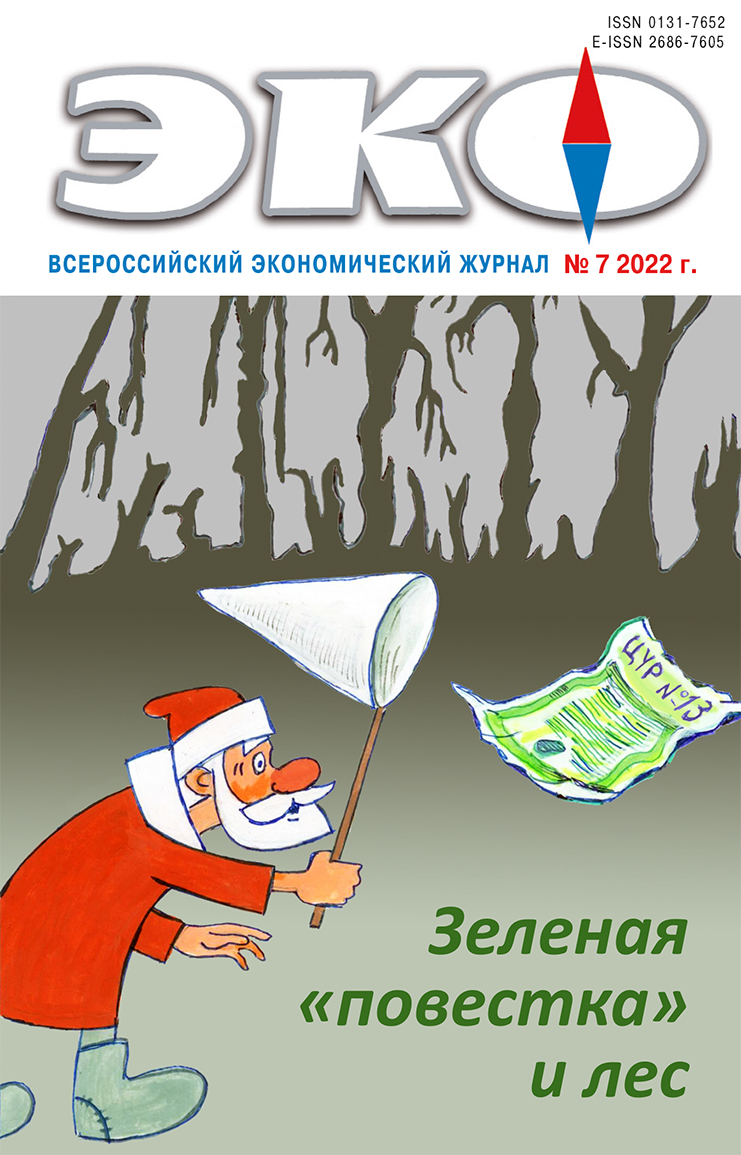Cover story: Green “Agenda” and Forest
Published 2022-07-05
Keywords
- climate agenda; climate change; climate change mitigation; adaptation of the economy and social sphere; energy transition; climate skepticism; low-carbon development
How to Cite
1.
Pyzhev А. No One Has Cancelled the Climate Agenda:Why Is It Important for the Russian Economy?. ECO [Internet]. 2022 Jul. 5 [cited 2026 Jan. 4];52(7):31-50. Available from: https://ecotrends.ru/index.php/eco/article/view/4467
Abstract
Not so long ago, the climate agenda was rapidly gaining popularity within Russian political and economic circles. After the events of February 2022, it seemed that the issues of climate diplomacy and participation in international projects to mitigate climate change no longer concern our country at all. The paper argues that the problem of climate change is now acquiring a special, new significance for the Russian economy. It analyzes the essence of contradictions between the supporters of the hypothesis about the anthropogenic causes of global warming, which dominates in the academic community and political circles in many leading countries, and the climate skeptics who do not recognize the justification of this cause-effect relationship. The economic reasons why the global climate agenda will unfold even though the peak of greenhouse gas emissions has not yet been reached, and the scenario of keeping the temperature of the Earth’s atmosphere within the 1.5-degree interval is becoming practically unrealizable, are described. A polemic with some theses of T. Gustafson’s book “Climate. Russia in the Age of Climate Change. An assumption is formulated about the true reasons for increasing sanction pressure on Russia’s raw materials exports from the perspective of the climate agenda. It is suggested that the domestic climate change agenda should be actively developed, with an emphasis on pragmatic relations with Western energy buyers and the development of a strategy of economic and social adaptation to climate change.References
- Арутюнов В. С. Концепция устойчивого развития и реальные вызовы цивилизации // Вестник Российской академии наук. 2021. Т. 91. № 3. С. 205–214.
- Ваганов Е. А., Порфирьев Б. Н., Широв А. А., Колпаков А. Ю., Пыжев А. И. Оценка вклада российских лесов в снижение рисков климатических изменений // Экономика региона. 2021. Т. 17. № 4. С. 1096–1109. DOI: 10.17059/ekon.reg.2021–4–4
- Глазырина И. П. Проблемы экологически неравноценного обмена в XXI веке // ЭКО. 2021. № 9 (567). С. 94–124. DOI: 10.30680/ECO0131–7652–2021–9–94–124
- Корытный Л. М. Миф о глобальном потеплении – тормоз зеленой экономики / Ресурсная экономика, изменение климата и рациональное природопользование: материалы XVI Международной научно-практической конференции Российского общества экологической экономики. Красноярск, СФУ, 2021. С. 86–87.
- Капица П. Л. Энергия и физика // Успехи физических наук. 1976. Т. 118. № 2. С. 307–314.
- Крюков В. А., Коломак Е. А. Пространственное развитие России: основные проблемы и подходы к ее преодолению // Научные труды вольного экономического общества России. 2021. Т. 227. № 1. С. 92–114. DOI: 10.38197/2072–2060–2021–227–1–92–114
- Порфирьев Б. Н., Широв А. А., Колпаков А. Ю., Единак Е. А. Возможности и риски политики климатического регулирования в России // Вопросы экономики. 2022. № 1. С. 72–89. DOI: 10.32609/0042–8736–2022–1–72–89
- Пыжева Ю. И., Зандер Е. В. Социально-экономическое разнообразие моногородов Сибири и Дальнего Востока: статистический анализ // Проблемы развития территории. 2019. № 3 (101). С. 49–61. DOI: 10.15838/ptd.2019.3.101.3
- Саенко В. В., Колпаков А. Ю. Перспективы российского энергетического экспорта в условиях реализации мер международной климатической политики // Проблемы прогнозирования. 2021. № 6 (189). С. 113–124. DOI: 10.47711/0868–6351–189–113–124
- Bugden, D. (2022). Denial and distrust: explaining the partisan climate gap. Climatic Change. Vol. 170. No. 34. DOI: 10.1007/s10584–022–03321–2
- Cook, J. et al. (2016). Consensus on consensus: a synthesis of consensus estimates on human-caused global warming. Environmental Research Letters. Vol. 11. No. 4. P. 048002. DOI: 10.1088/1748–9326/11/4/048002
- Golroudbary, S.R., Makarava, I., Kraslawski, A., Repo, E. (2022). Global environmental cost of using rare earth elements in green energy technologies. Science of the Total Environment. Vol. 832. No. 155022. DOI: 10.1016/j.scitotenv.2022.155022
- Gustafson, T. (2021). Klimat. Russia in the age of climate change. Harvard University Press. 336 p.
- Liu, Z. et al. (2020). Near-real-time monitoring of global CO2 emissions reveals the effects of the COVID-19 pandemic. Nature Communications. Vol. 11. No. 5172. DOI: 10.1038/s41467–020–18922–7
- Liu, Z. et al. (2022). Monitoring global carbon emissions in 2021. Nature Reviews. Earth & Environment. No. 3. Pp. 217–219. DOI: 10.1038/s43017–022–00285-w
- Spencer, R.W. (2007a). An Inconvenient Truth: blurring the lines between science and science fiction. GeoJournal. Vol. 70. Pp. 11–14. DOI: 10.1007/s10708–008–9129–9
- Spencer, R.W. (2007b). How serious is the global warming threat? Society. Vol. 44. Pp. 45–50. DOI: 10.1007/s12115–007–9002–3
- Sun, L.-L., Cui, H.-J., Ge, Q.-S. (2022). Will China achieve its 2060 carbon neutral commitment from the provincial perspective? Advances in Climate Change Research. Vol. 13. No. 2. Pp. 169–178. DOI: 10.1016/j.accre.2022.02.002
- Venghaus, S., Henseleit, M., Belka, M. (2022). The impact of climate change awareness on behavioral changes in Germany: changing minds or changing behavior? Energy, Sustainability and Society. Vol. 12. No. 8. DOI: 10.1186/s13705–022–00334–8
- Wei, Y.-M. et al. (2021). A proposed global layout of carbon capture and storage in line with a 2 °C climate target. Nature Climate Change. Vol. 11. Pp. 112–118. DOI: 10.1038/s41558–020–00960–0

